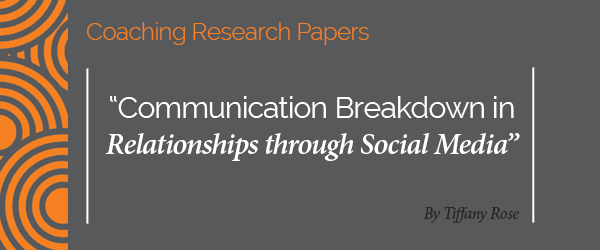A Research Paper created by Tiffany Rose
(Career Coach, UNITED STATES)
How do we communicate?
Is Social Media to blame for the breakdown of communication in relationships?
It is almost impossible to remember life without the internet. How did we connect, make plans, send flirty texts before cell phones? How did we show our emotions without the aid of emoticons?
The global population is seven billion and rising and the number of mobile phones has reached almost five billion (and rising!). One would think with all this technology; social media sites such as; Twitter, Facebook, MySpace and LinkedIn, wouldn’t it have enhanced our ability to stay connected? But perhaps not so on an emotional level.
Evidence has suggested that ironically, this is not the case. Social media may connect people on some levels, but it has its darker side which is becoming more and more recognised in its role in ironically the ‘breakdown of relationships.’
In a recent article in the UK newspaper, The Guardian * it was reported that attorneys in both the UK and the USA report an increasing number of divorces that indicate that social media was a major cause in the breakdown of the relationship. In fact one in five attorneys surveyed reported it was a growing issue with their clients. In the UK up to 33% of divorces filed indicate that inappropriate internet use through social media sites was a primary cause of the breakdown of the relationship.
“It’s complicated…” Facebook status
Facebook: a blessing or a curse?
For the positives of connecting with childhood friends; high school sweethearts and making new friends of friends of friends….Facebook is one of the contributing factors to the breakdown of relationships.
Facebook has changed many aspects of human behaviour. It’s affecting relationships and marriage breakdowns in ways we couldn’t have predicted. There are drama stories (reported in on-line chat rooms) of couples breaking up as a result of a partner changing their status from ‘in a relationship’ to ‘single’ on Facebook without consulting with their partner first.
Have you ever been dumped via Facebook? According to a SNAP Interactive (the makers of iPhone dating app “Are YOU Interested?”), a survey of 1000 users- 70% male and 30% female- indicates that Facebook “Dear John” letters are joining emails and texts as new digital ways to leave your lover.
The Results
While only a quarter of those surveyed say that they’ve been let go from a relationship that way, nearly half passive-aggressively use it to not hang out with the person they’re dating. But then you can fall into the category of the 35% of people who use it to say they didn’t want to hang out, anyway.
*The graph below shows breakups chronicled on Facebook. It allows you to see at what times people are breaking up. David McCandless and Lee Bryon, the team behind the graph reviewed status updates of more than 10,000 people to see at what times people had broken up. Maybe not surprising that there’s a peak around Spring Break, and harsh run a few weeks leading up to Christmas!
So, is the cyber world addicting?
People can become addicted to online communication, which is not all that different from addiction to other types of “normal” behaviors such as alcohol or food. Research shows that the pleasure that is obtained by these online communications can actually trigger neurological changes in the brain, particularly in the need for the “feel good” chemicals. The ability to talk anonymously online to others poses a problem, but so does the ability to create an online persona that may be very different than reality. This addiction to a fantasy world or alternate reality may be a result of unhappiness, chronic negativity, lack of self-esteem or inability to have a real-life relationship.
Dating online allows that person to feel desired, sexy and connected, which in turn releases those “feel good” chemicals in the brain, such as serotonin, dopamine, and norepinephrine. The more online interactions occur the more the brain wants that reward, causing the cycle to continue and resulting in withdrawal from the real world and reliance on the virtual world found online. This in turn leads to a breakdown in social behaviour and etiquette. It’s easier and more comforting to hide behind a computer screen then have a face to face interaction.
Before the internet
Let’s take a trip down memory lane to the early 90’s when we’d heard a rumour of Apple and a genius computer nerd, Steve Jobs, but we couldn’t for one mili-second imagine our lives would dramatically change with the boom of the internet. Today’s Generation Z is born into a different time. The world has become smaller. It’s the Generations X and Y and the Baby Boomers who have experienced the decline in social inaptitude the most.
Instead of writing a hand written letter to a penpal in India if say, you lived in England, you could suddenly video chat (Skype) or send letters instantly (‘emails’). Prior to the cyberworld, there was more social interaction. Neighbours would pop over for tea. People would chat on the phone. There was more body contact and social interaction. You didn’t dare run late and appear disrespectful to your friend or date. There was no on-line dating and so you spent more time focusing on getting to know the person instead of ‘scrolling down a list’ of other romantic prospects on a dating site, which can feel like shoe shopping! Any miscommunication was rectified in person.
And now…
